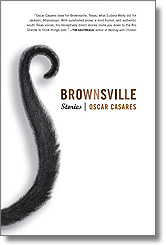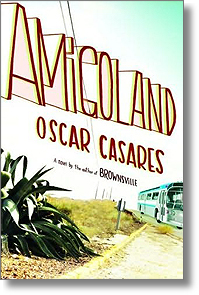
Oscar Casares
You might not expect it on first glance, with his chiseled jawline, dark hair, and perfect teeth, but Texas native Oscar Casares is not a model. He is the author of two books, a program director, and an instructor.
We met in the vacant halls of Parlin, and he invited Amanda and me into his office. Outside, the foldout chairs lined the South Mall lawn, leading up to the Tower. “15…16…17…” the man on the microphone tested as we made idle chitchat. Finals had been the week prior, but one glance from Casares’s cheery smirk and you wouldn’t know it. Looking at his disheveled office, though, might give off a different impression.
“It’s a never-ending process,” Casares told us, “trying to carve out time.” With a family and the responsibilities of directing UT’s MFA in creative writing, on top of teaching, we wondered how he ever has time to write. “I try to design my day so that the time remains somewhat sacred, but there’s no way the rest of my responsibilities won’t encroach on that.” Large chunks of time are especially precious to him now that he is working on a new novel. “It’d be different if I were working on stories. That’s a little more manageable.” In addition to that, he is also working on a collection of essays. “The essays are a good break from the novel, because it’s a lot more immediate, easier to pick up and put down.”
“That was the first lesson I learned when I started writing,” he said, regarding finding time to write, “because I was still working another job, in advertising, and I didn’t know whether I was going to be able to actually write stories; I just didn’t know if I could make that leap.” Creating during what little free time he had, he wrote at night, in airports and hotel rooms. The “commodity” all writers are searching for in their daily lives, he realized was just time. Though he was comfortable in his advertising position, Casares quit his job in favor of full-time writing in the summer of 1996. Not having the responsibilities he has now, he was able to concentrate solely on writing. “I woke up and wrote. Maybe went to lunch and then I read and then I wrote again. That was what I did, that was my life.”
“At some point, everyone needs that, whether it’s for 6 months or 2 years,” Casares stated. He pressed on, publishing stories here and there for the next three years until he was admitted into the famed Iowa Writers’ Workshop in ‘99. “You definitely pick up some tangible lessons that you can go home that night and say ‘oh, that’s what I needed to do,’ but there’s a misconception of, ‘I’m going to go learn how to write and become a better writer.’” Casares mentioned that, while graduate creative writing programs are about giving you time, they also help speed up the process of a young writer’s development. And, if they’re teaching you anything, they’re teaching you about your own writing. “You have people discussing your work very candidly with an effort to make it better. In that way, you begin to learn, but you really are learning about your own work. This is what I do, here is something I need to improve.”

Brownsville
During and leading up to his time at the Iowa Writers’ Workshop, Casares wrote story after story and later realized they were all taking place in the same world, the world of his childhood in the Rio Grande Valley town of Brownsville, Texas. “I began to realize these stories were taking shape. There was a world I was writing about that wasn’t common to most people’s experiences,” said of the development of Brownsville, his first book. “All that time, each story was an apprenticeship of sorts, my learning curve.”
“I knew how to tell a story in this oral tradition, and was very aware, intuitively, how to structure a narrative. I didn’t know what literary stories were like, I hadn’t been enlightened in that way.”
I wasn’t much of a reader when I was a kid, though I desperately wanted to be. Casares didn’t read when he was young either. “If I read one book a year, I was pushing it. Seriously.” While my disinterest in reading came from learning problems, Casares simply lost interest in the lack of urgency compared to the family stories he was raised on. “In a way, I think it was good, because I didn’t have preconceived notions of what a story should be,” Casares said, “what I knew was what I’d heard.”
When he decided he wanted to be a writer, however, he realized, as we all do, that writing and reading go hand in hand. Sometimes, though, the reading turns into research as opposed to entertainment. “When I started reading, it was to search out these answers, and to understand how someone like [Raymond] Carver or Flannery O’Connor were having such effect. Everyone that I read and even now when I read them, I’m reading to learn something beyond the text. They were doing something that I needed to figure out and solve for myself.”
Mimicking, Casares said, was one of the techniques he employed when first starting to write. Young writers shouldn’t hesitate to attempt mimicking other authors until they manage to be comfortable with their own voice, he said. “That’s how we learn languages, we hear accents, we try to reproduce the same thing but eventually we develop our own tongue. So in this same way, I could pick any writer who anyone adores and say, write a story this way, and you would maybe capture some of that cadence for a couple of pages, but eventually your own voice would come through, and that’s just the way it is. The method is only a way to get started.”
Casares eventually did find his own voice and through the help of a friend got an agent to help him publish his first book in 2003. Brownsville, a collection of stories that come together from the authors childhood inspirations and observations to personify a community on the Texas-Mexico border, was one of the American Library Association’s Notable Books of 2004 and gained acclaim from, amongst others, The New York Times.

Amigoland
Since then he has helped develop the creative writing program at UT from an MA to an MFA and released his first novel, Amigoland, which was the 2010 Austin Mayor’s Book Club selection. Not being the stereotypical writer who “can’t put a book down, and then at 6 or 7 they start writing their own stories” and coming from a tradition of oral stories, Casares found the best way to keep himself, and the eventual reader, interested during the writing process of Amigoland was to pretend there was someone in front of him to tell the story to. “So that becomes part of my motivation, not to lose that relationship.” But there is a “schizophrenic” relationship in writing, he said. “Your dream reader should be yourself,” he explained, “I’m writing and writing for myself, would I keep reading at this point or would I find this boring and not compelling?”
Struggling with the complexity of the novel, he reached out to a former Iowa Workshop friend. “I didn’t have the thread yet, he was really very helpful. That’s another benefit of graduate school, the friendships that last.” After being lost in the story for five years, though, he finally rose from the darkness and published the novel in 2009.
Sadly, his first novel was released into a publishing market worse off than six years prior when his first book was released. It doesn’t seem to affect Casares too much, though. “It’s scary, but the point is the entire industry is in flux and changing.” He is confident, however, that writers, as well as their readers, will adapt even if we don’t see physical books on physical shelves. “I worry about it, but I worry about it for two seconds a day. There’s nothing I can do about it. Trying to figure out a novel, it’s consuming. I just worry about doing my job. If I do my job well enough, it’ll find its medium.”
Marketing and knowing your market certainly has an undeniable affect whether it’s the publisher or the author doing the marketing. “The publishers still do quite a bit, but there is a definite transition to move toward having the writer as more of a salesperson with social media, and what have you.” One notable difference between the publishing of his first and second book, Casares said, was that with the publication of the second he received a letter outlining various things he could do to promote the novel.
Despite these changes in the industry and in his personal life, having a wife and kids, Casares’s goals haven’t changed. “I’m still learning. The goals haven’t really changed. It’s still about writing and figuring out for myself how to tell a good story.”
“The one piece of advice I give all the time is that whether you’re working on something specific to a project or not, I think even more important is to be writing consistently. And that means writing when you have nothing to write about. I kept a journal, but the journal wasn’t the important part, 90 percent I’ve done away with, but the reason for them, is it gave me time to get comfortable with a blank page. It’s much easier to write a novel if you’re used to writing every day. That voice changes every story, so getting into that routine is a major part of being a writer. So that when you do see that blank screen, you’re able to work through it.”
Oscar Casares was born in Brownsville, TX and is the author of two books. Brownsville, a collection of stories, was released in 2003 & Amigoland, a novel, was released in 2009. He currently teaches creative writing and heads the MFA program at the University of Texas at Austin.






 While pondering Deafheaven’s songs, I thought a more fitting technique for me would be to build my stories as a musician records a song. Throw down the drums, bass, and some guitars on a demo and the song takes shape. Just as writing a complete story on the first draft allows me to have something to work with.
While pondering Deafheaven’s songs, I thought a more fitting technique for me would be to build my stories as a musician records a song. Throw down the drums, bass, and some guitars on a demo and the song takes shape. Just as writing a complete story on the first draft allows me to have something to work with.
